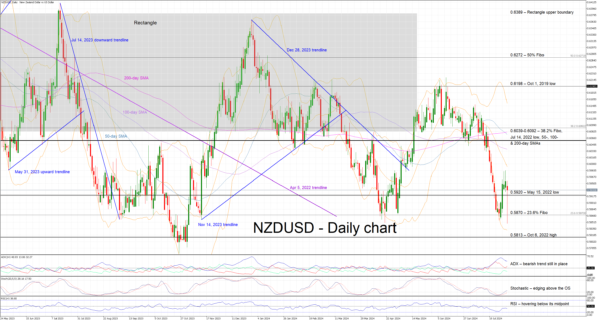- Market in crisis mode after Friday’s US labour report
- An RNBZ rate cut could be on the cards if data weakens
- China’s problems hamper progress in the region
- Kiwi in desperate need of good data prints
Markets in disarray
With the market digesting last week’s events, especially Friday’s US labour market report that triggered discussions of a US recession, and the heightened probability for aggressive rate cuts by the Fed during 2024, the focus turns to the Asia-Pacific region. The RBA is holding its rate-setting meeting on Tuesday with the market seeing decent chances of a rate hike while the neighboring Reserve Bank of New Zealand is preparing for its August 14 gathering.
Is the RBNZ ready to pull the trigger?
The early July RBNZ meeting proved slightly more dovish than widely expected as Governor Orr et al were possibly keeping their options open while waiting for the critical end-July Fed gathering. However, they did highlight the importance of incoming inflation data by stating that “the extent of this monetary policy restraint will be tempered over time consistent with the expected decline in inflation pressures.”
The inflation report for the second quarter of 2024 surprised on the downside and showed a significant slowdown in quarterly CPI. The year-on-year figure dropped to the lowest level since July 2021 and, while it is still above the 1-3% target range, a downtrend is firmly in place. The market is currently fully pricing in a 25bps rate cut at the early October meeting, with a non-negligible chance for a move next week.
The remaining data since the July RBNZ meeting, for example consumer confidence and business sentiment surveys, have been positive but the focus is now firmly on Tuesday’s employment report and Thursday’s inflation expectations indicator published by the RBNZ.
Considering that the latter reflects the business managers´ inflation expectations two years from now, this indicator has been successfully capturing the recent disinflationary trend. The last print in May dropped to 2.33%, the lowest level since August 2021. Another move lower on Thursday would cement rate cut expectations by the RBNZ, since inflation will probably return to the 1-3% target range during Q3.
Importantly, the labour market report for the second quarter of 2024 will be published on Tuesday. Compared to other regions, the unemployment rate has been aggressively climbing higher since the 2022 lows, helping labour costs gradually ease, in effect removing one of the main headaches faced by other central banks.
China’s problems hamper growth in the region
Staying in the region, the market remains gravely concerned about China. The recent interest rate reductions could ease the pressure on the banking sector, but they probably cannot solve the housing sector problem. China’s Politburo highlighted the administration’s focus on supporting domestic demand, but this is a colossal task when the housing market is struggling.
Following the recent downside surprise in GDP for the second quarter of 2024 and the mixed PMI surveys, the calendar this week is rich with trade data and Friday’s inflation report. Since printing at 0.7% in March 2023, headline CPI has been drifting lower, which is another indication of low domestic demand. An upside surprise on Friday is probably not in the cards, but inflation could rise in the medium-term if the producer price index maintains its recent uptrend from the mid-2023 lows.
Kiwi could benefit from stronger data
The kiwi remains under pressure as the strong correction in the kiwi/dollar pair from the early June highs might still have legs, despite the dollar weakening across the board on the back of expectations for aggressive easing by the Fed.
A positive set of data releases this week could considerably dent the decent chances of a rate cut at next week’s RBNZ meeting and allow the kiwi to resume its climb towards the 0.6050 area.
On the flip side, the combination of a weakening labour market and softer inflation expectations could really put Governor Orr et al in a dilemma to cut, thus reducing chances for a meaningful recovery in the kiwi.










